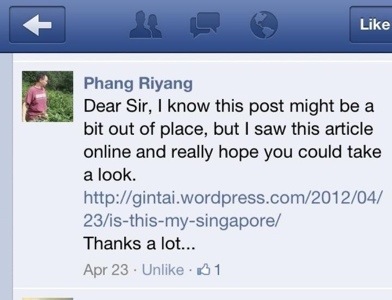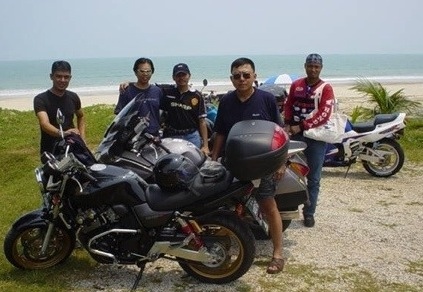Blogger Gintai meeting with Minister K Shanmugam at his office
Blogger Gintai meeting with Minister K Shanmugam at his office
Posted on 16/06/2012
On 15/6/12 @11.40 am, I had a private meeting with Foreign Affairs and Law Minister Mr Shanmugam in his office. It lasted for about an hour. Only the Minister, myself and one of his trusted grassroots assistants Henry were present.
The meeting was arranged by Henry. He dropped me an email dated 1st May. Subsequently, the PA was able to fix it on 15 June which was my off day. I arrived there much earlier at about 11.15am. I had to clear three security barriers – the main entrance to The Treasury building, scanned all my personal belongings and walked through the metal detector, exchanged a security pass, passed through another set of security gate to the lift. Even on the floor of his office, I had to pass through yet another security gate before meeting the police security officer outside his office. Henry came later and we introduced ourselves. We chatted briefly whilst waiting for the Minister who was having a meeting in his office.
Henry told me that he is working in the finance sector. He is a volunteer and help out in the Minister’s ward. His area of responsibility includes the new social media where he monitors and reports to the Minister. He declares that he is a fan of my blog. I took an immediate liking to him cuz he is so humble and friendly even though he is CEO of an investment company.
When the PA summoned us to the Minister’s office, I was shown to the comfortable chairs at the corner of his spacious office. He was wearing a simple long sleeve shirt with a dark colored sweater and we sat down. He looks serious but friendly with his hair clearly thinning and exposing his shining pate. He shook hands with me and thanked me for coming to see him.
I briefly introduced myself to him. He then told me that he read my little article and he wanted to find out more of it. He also read some other articles on my blog. He just wanted to discuss with me some of the current issues. From the word go, we started an amicable discussion of current issues ranging from housing affordability, ever popular immigration issues, social welfare spending such as medical, CPF, defence expenditure, jobs etc. There were many more issues which we did not even mention due to lack of time. The one hour allocated to our meeting just whisked pass in a moment.
Minister Shanmugan seemed to be very concerned about housing affordability mentioned on my blog here. He explained to me about HDB pricing policy. According to him, all state land is under reserves. If a piece of land is needed to build a block of HDB flats, the government will have to pay for this piece of land into the reserves. It is the same for private development or other uses. He promised to talk about housing again when we next meet.
Minister Shanmugan assures me that every Singapore citizen will definitely have a flat provided he has a job. No citizens should be deprived of his ability to get a HDB flat as a first timer newly married couple. He says the government gurantees that everyone will get a flat at an affordable price. Of course, if you sell off your flat and then spend all the money from the sale of the flat, it’s a different story he says. When I mention about divorce cases etc, the Minister says that the government will still help on a case by case basis. He then asked me to provide details on TO Zaidi Blond’s case so that the Minister can understand the facts better. I agreed to provide details. He also said that even where people are on a very low income, government gives a lot of subsidies, to help them buy a flat.
When I told the Minister that train drivers in UK are earning about 50,000 pounds per year, he said that figure needs to be checked. Minister Shanmugan says that assuming it’s correct, the position of a British train driver and a Singaporean one will have to be considered after the different taxes in Britain and Singapore, and the fact that the Singaporean will get subsidized housing and children will in general get better education. He promised to go through the data with me the next time we meet. He also agreed with me that salaries should be looked at again, as we go forward.
I then told him that in UK or many European countries, basic items do not have GST. In Singapore, though our GST is only 7% compared to theirs ranging from 20% to 25%, I would still prefer their system. He then made a number of points. The difference between paying 7% and 20% is very big, and people will feel it. Second, most of the GST is paid by the top 20% of the population, and foreigners. The lower income gets GST offsets, and other payment including rebates. The GST was in effect a system of transferring money from the wealthy to the less well off. The government will have to spend lots of money and resources to maintain a mechanism to monitor the so many loopholes resulting in lesser GST collected and spending more with the net result of less revenue. A friend of his shared a real-life example: a traveller was buying a piece of painting having to pay about 3000 pounds of GST. When the shop owner sensed his reluctance to pay the extra 3000 pounds in GST, he offered to classify it under “educational aid” to avoid paying the GST. These loopholes will benefit the rich more than the poor, and reduce the amount the government gets to spend on the less well off.
It’s better that Singapore enforces a flat rate of 7% GST on everything. The GST collected is then used to help the people with lower income, and GST rebates are given as well. Our approach is to have everyone pay GST but target the support to the lower income. This is more efficient. He promised to show me some figures the next time we meet.
According to Minister Shanmugam the top 20% income earners, companies, and non-Singaporeans pay 84% of the total taxes in Singapore to finance our $52 billion government budget expenditure. The rest pay only 16% of the total taxes. In other words, we are really depending on the top 20%, companies and foreigners to sustain an important part of our budget and government expenditure. This is rather shocking to me.
Still I pointed to him that the influx of immigrants is really sore point. Citizens are unhappy over the large number of immigrants. It is a fact that the government cannot ignore. I cited figures of nearly 1.8 million (include PRs) out of our 5.2 million population yet the government still wants to bring in despite the current figures. Minister Shanmugam clarified that this figure of 1.8 million includes people who work as househelp and construction workers. These are jobs that Singaporeans don’t want to do. There are many other jobs that Singaporeans don’t want to do, and we have no choice but to have foreigners come and do these jobs.
Minister Shanmugan acknowledged the widespread unhappiness over new citizens and immigrants. But he warns that a massive grey tsunami is coming to Singapore in another 15-20 yrs time where only 2 to 3 Singaporeans will be working for every senior citizen who will not be working. We need those immigrants in their prime to boost up the economy and support an aging population. I countered that with so many immigrants; we are diluting our identity and creating social problems. He agreed that there are problems but asked me to consider what will happen without some immigration. We will suffer serious decline in the future. He said that if the government was simply populist, the easiest thing to do will be to completely close off immigration. But that will affect our young people most by increasing their tax burden in the future, and seriously affect our economy, our jobs and livelihoods. He said that the government will have to explain these issues better. An aging population, and a declining birth rate will impose severe costs on Singapore. If we don’t deal with it now, it will be too late. He said that this is one of the most serious challenges facing Singapore, and we need to discuss these issues, seriously and carefully, as a country.
When I commented that bringing in more immigrants to compete for jobs with locals, he said that bring in foreign workers is to increase the economy so that our workers will get better jobs and better pay. He said that the statistics show that in the years when more foreign workers came, the salaries of Singapore workers grew more, because the economy grew well. Our employment rate is at below 3% and that is lower than many countries. We have tightened up on the flow of foreign workers, but as a result many companies are now facing difficulties and are very unhappy. He was concerned that if many companies are unable to carry on their business, then our workers will start losing their jobs as is happening in many places in the wrold. He also said that though companies bring in foreign workers, MOM has set up a unit to look into unfair practices. If Singaporeans are discriminated against, MOM will deal with it. I then quoted two of my Indian colleagues’ wives who could not get a job with NTUC cuz they preferred Chinese. NUTC recently went to China to mass recruit workers. Minister Shanmugan straightaway asked me for the full details of the two quoted cases. He would want to investigate. He again added that complaints on unfair practices can be made to MOM and MOM will look into these issues.
One of my colleagues came from HDB parking enforcement section. Many of us are aware that HDB shut down its car park operations and then outsourced to a sister company. The same car park enforcement officer is still performing the same job but this time under different management in the sister company with reduced pay and benefits. This is clear cut cost cutting measure tantamount to exploitation which he agreed. I told him that should not be the way. It’s an easy option out. It is also happening in other places such as airport SATs services etc. He said that he would send my feedback to his colleagues.
The Minister seemed taken aback when I told him that many Singaporeans are going over to JB to buy the exact medicine which is about a third of what it costs here. In fact, some doctors even encourage patients to procure their medicine supply from JB. He replied that he would look into it.
To my next question on why the government or CPF charges an “admin fee” when I use my own CPF to pay for my medical fees in polyclinic and hospital? Do I get charged for using my own money in the bank to pay for purchases? He will pass my message onto the relevant agency. He seemed to understand my point, and I won on that.
Minister Shanmugam’s PA kept reminding him of his 1.00 pm lunch appointment. With that, when it was late, he had to leave. I thanked him and told him that I will blog about this meeting.
I had prepared many questions but didn’t have the time to seek his enlightenment. Questions such as “Why Singapore could not produce world class brands or enterprises like Ikea, Samsung, LG, Assus or HTC?” Instead our economy is controlled mostly by GLCs and NTUC enterprises? Why do we only have SPH who is always headed by an ex-PAP Minister? These are persistent questions that need to be addressed by the government if it is sincere and genuine in the long-term interests of our country. Like what Minister Shanmugam says it will take him more time to answer them at another time till we meet again.
Source:
http://gintai.wordpress.com/150-2/










